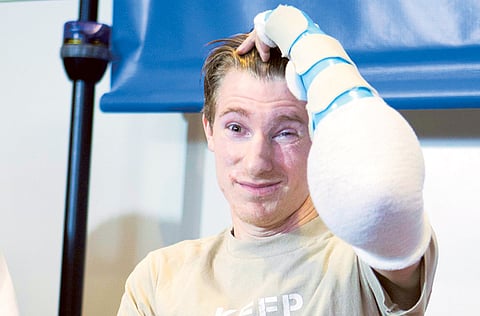US soldier welcomes double arm transplant
Almost four years ago, he lost both arms and both legs while serving in the Army in Iraq

Baltimore, Maryland: His mother can manicure his nails now. She can smooth lotion onto his fingers. She can rub her cheek over the back of his hand. Soon, she hopes, he will be able to wrap his new arms around her and give her a hug.
On Tuesday, Michelle Marrocco sat in the audience at Johns Hopkins Hospital as her son, Brendan Marrocco, 26, rolled his wheelchair to the front of the room to show the world his new arms. He brushed back his hair with them, scratched his chin with them, folded them in his lap, as the camera lenses clattered and reporters asked how they felt. He was pale, but handsome and matter-of-fact, wearing his tan T-shirt and black shorts. His transplanted arms are still wrapped in splints and bandages. The plastic and metal mechanical arms he had for years were gone. He had flesh-and-blood hands again, which he said felt like his.
Almost four years ago, on Easter in 2009, he lost both arms and both legs while serving in the Army in Iraq. The vehicle he was driving tripped a powerful roadside bomb. He lost both legs above the knee, his left arm below the elbow, and his right arm above the elbow.
On December 18, a team of hospital surgeons, which had been practising on cadavers, transplanted two new arms, procured from a deceased donor. Now, six weeks later, he can bend his left elbow and rotate the arm slightly. “This arm,” he said, indicating his right, “is pretty much not much movement at all. Not yet.”
He has no feeling in his hands, “but we’ll get there,” he said. Marrocco, of Staten Island, New York, is the first service member to receive a double arm transplant, and the hospital said he is one of only seven people in the United States who have undergone successful double arm transplants.
“I hated not having arms,” he said. “I was all right with not having legs. Not having arms takes so much away from you, even your personality. You talk with your hands. You do everything. When you don’t have that, you’re kind of lost for a while.”
Someone asked what was the first thing he said to those around him after the surgery. “I love you,” he said. “When they had first taken the breathing tube out, I think the first thing I said was ‘I love you.’ I was just happy. I was happy that the surgery was over and I had arms.”
Regeneration of nerves
Doctors said that the nerves from Marrocco’s stumps have to regenerate into his transplanted limbs to reach his hand and restore sensation. The nerves regenerate a maximum of an inch a month, so he faces months and years of rehabilitation. Doctors said his left arm, because it was amputated lower, will probably come back first.
Marrocco said he feels that the transplanted arms belong to him. “I never really accepted the fact that I didn’t have arms,” he said. “So now that I have them again, it’s almost like it never happened. It’s like I went back four years and I’m me again.” “I just want to get the most out of these arms,” he said. “I just want to get to the point where I can be completely on my own.”
“I feel like I’m getting a second chance to start over after I got hurt,” he said. “I’m excited for the future and to see where I can go with it.”
The surgery was done by a special team of transplant experts headed by W.P. Andrew Lee, professor and chairman of the Department of Plastic and Reconstructive Surgery at the hospital. Lee has said that donor and recipient do not have to be of the same gender — about two years ago, at a California hospital, a female recipient successfully received a transplanted hand from a male donor. But the limbs should match in size, skin colour, tissue and blood type.
Marrocco’s new limbs seemed to match him well, although only his fingers were visible on Tuesday. The hospital would not comment on the donor, citing privacy issues.
Advice for amputees
There are hundreds of military amputees around the country — including four others who have lost four limbs and others who have lost three, two or one. He had advice for the others. “Be stubborn,” he said. “There’s a lot of people who’ll say you can’t do something. Just be stubborn. Do it anyway.”
Doctors said he was being discharged from the hospital on Tuesday, but he would stay in the area for several more months for rehabilitation. As the news conference was ending, his mother, 53, was asked to comment. She rose and said: “It’s the beginning of a new life for all of us. Our life has been [on] hold for the last four years, almost... Now he will be independent, and when he comes home, he’ll be the Brendan we’ve all been looking for.” And “when he’s ready,” she said, she hopes to get a hug.



